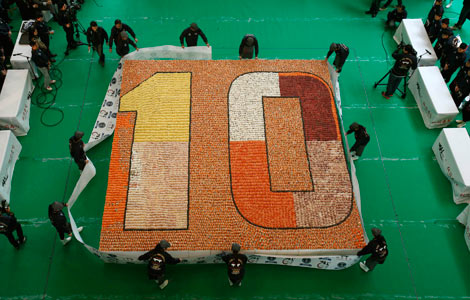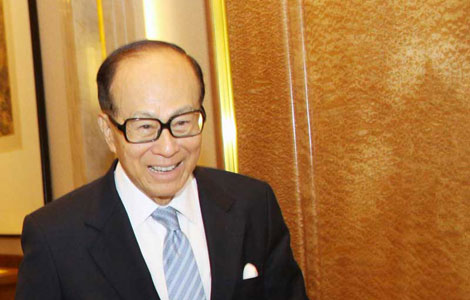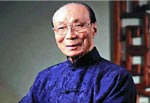China is keeping inflation under control
Updated: 2014-01-10 12:14
By Michael Barris in New York, Chen Jia in Beijing and Yu Ran in Shanghai (China Daily USA)
|
|||||||||
China's slowing inflation rate, combined with manufacturing overcapacity, lowers expectations of any imminent change in the country's tight monetary policy, economists said.
However, one economist said that the steady contraction in producer prices over the past two years signals serious overcapacity issues in China's manufacturing industry, indicating that 2014 will bring a slowdown in manufacturing investment.
The Consumer Price Index, a widely watched gauge of inflation that measures changes in the price level of a market basket of consumer goods and services purchased by households, was 2.6 percent last year - the same as in 2012, the National Bureau of Statistics said on Thursday. The government had set a full-year target of 3.5 percent at the beginning of 2013.
For December, consumer inflation fell to a seven-month low, 2.5 percent, from 3 percent in November and 3.2 percent in October, driven by incremental increases in food prices.
December food prices increased 4.1 percent on average, less than November's 5.9 percent increase.
Sophii Weng, a New York-based economist with Standard Chartered Bank, told China Daily in an e-mail that she is "not concerned about inflation in 2014 for China". She said she expected accelerating food inflation to push consumer prices moderately higher in 2014, "which will help the People's Bank of China continue with its tighter monetary policy".
She attributed slowing consumer-price inflation in December to a benign growth rate, as well as the central government's crackdown on public-sector spending on foods and gifts. She said she expects "mildly higher" inflation in the first half of this year.
Yingying Xu, an economist with the Manufacturers Alliance for Productivity and Innovation in Virginia, echoed Weng, saying, "This year we don't really expect to see a big jump in the inflation rate (in China)".
"The inflation level is under control at this moment. It doesn't pose an immediate threat to the (country's) growth, or monetary policy," Xu said.
Reflecting the slowdown in China's economy, December factory-gate prices of industrial goods fell for the 22nd straight month - continuing China's longest period of manufacturing deflation since the 1990s.
The Producer Price Index, which measures the average change in prices received by industrial goods producers, dropped 1.4 percent in December from a year earlier, matching November's decline and below October's 1.5 percent drop, the statistics bureau said. For 2013, PPI fell 1.9 percent, more than 2012's 1.72 percent drop.
Xu said the PPI's steady contraction in the past two years signals that overcapacity in China's manufacturing industry, particularly in metals manufacturing, is "really bad" - and points to a slowdown in 2014 manufacturing investment.
Despite the prospect of possible job losses as manufacturing investment slows down - some plant shutdowns are expected in the over-producing steel industry, for example - the government's transition to an economic model that re-emphasizes the service sector may help offset the decline in job-creation, Xu said.
"At this stage, China's investment in the manufacturing industry is really capital-intensive," she said. "The amount of jobs it created is not as many as 15 years ago, when China still had a huge surplus of low-wage and unskilled labor.
"Nowadays when the working age population is declining it actually has a labor shortage. So the rebalancing helps to ease the significant wage growth in the manufacturing sector."
"The development of the service sector can actually produce more jobs than the manufacturing sector," Xu said.
Nevertheless, China's manufacturing enterprises are feeling the effects of the economic slowdown. Zhang Guanjin, general manager of Shaoxing Jinyong Textile in Zhejiang province, said export orders fell in 2013.
"The company received significantly fewer (overseas) orders, with nearly 10 percent of regular clients not placing any new orders last year," he said.
Zhang said he doesn't expect conditions to improve for two or three years because of the slow global recovery and increasing labor and raw materials costs. He said he is focusing on expanding in the domestic market rather than looking beyond China's borders.
Chang Jian, chief economist in China at Barclays Capital, said weak industrial production may point to an easing of GDP growth momentum. Chang predicts that the GDP growth rate for the fourth quarter is likely to be 7.6 percent, down from 7.8 percent in the third quarter, bringing 2013 growth to 7.7 percent.
That would be the slowest growth pace since 1990 and just above the 7.5 percent goal set by the government for the year.
Xu Hongcai, a senior economist at the China Center for International Economic Exchanges, said that without a new driving force for the economy in the short term, the GDP growth rate may continue to moderate.
"We can expect more market vitality to be stimulated by the reform measures, especially in the financial system, and expect high-quality and sustainable development in the long run," Xu said.
Contact writers at michaelbarris@chinadailyusa.com
(China Daily USA 01/10/2014 page2)

 Fidel Castro makes rare public appearance
Fidel Castro makes rare public appearance
 Migrants feel pain of separation
Migrants feel pain of separation
 Websites to be liable for sales of bad food, medicine
Websites to be liable for sales of bad food, medicine
 Largest sushi mosaic created in HK
Largest sushi mosaic created in HK
 UK police pick through US helicopter crash site
UK police pick through US helicopter crash site
 Riding the waves down under
Riding the waves down under
 The long-living rich in China
The long-living rich in China
 US skiing star Lindsey Vonn out of Sochi Olympics
US skiing star Lindsey Vonn out of Sochi Olympics
Most Viewed
Editor's Picks

|

|

|

|

|

|
Today's Top News
US police all a-twitter about Weibo
China's role in Middle East will be enhanced: FM
Abe's new frontiers: Africa, Middle East
Rodman sorry for Bae comment
Reunion proposal rejected by DPRK
Apology urged for insulting Chinese
China's oil pipelines riddled with defects
Higher targets set for emission reduction
US Weekly

|

|







